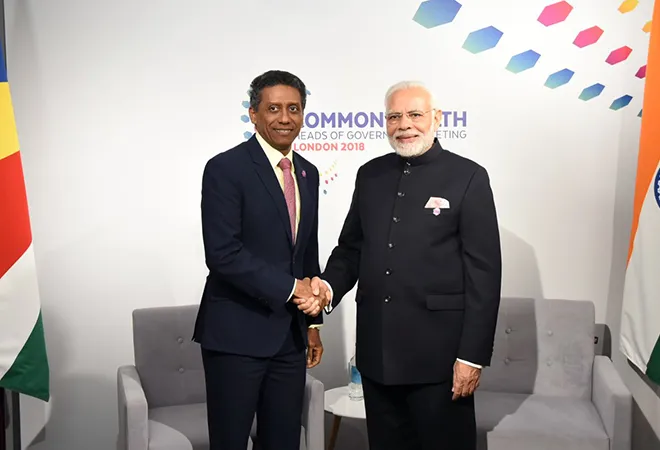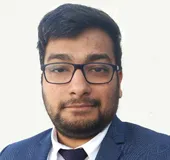-
CENTRES
Progammes & Centres
Location

When Seychelles President Danny Faure arrives in New Delhi for his first visit to India between June 25 and 26, talks on Assumption Island are expected to take centre-stage despite media reports suggesting there would no further discussions on the issue.
This meeting will be third meeting between Faure and PM Modi this year, thereby, testifying to the importance both leaders attach to each other and to the growing India-Seychelles bilateral relations.
The island nation of Seychelles, strategically located in the context of sea lanes of communication (SLOC), has long been an Indian ally. Both India and Seychelles, since the latter’s independence in 1976, have shared a multi-faceted partnership, and excellent friendship, one which is based on mutual respect and on trust.
Both nations share common aspirations of peace and sustainable development for respective nations and their people. As a result of all this, a unique relationship of mutual respect and trust has been developed between the two countries, and this is not dictated by big-small country play-offs.
The government of Seychelles, based in Victoria on Mahe Island, is 1,135 kilometers (705 miles) northeast of Assumption Island. Human development, dignity, and aspirations of Seychellois remain at the core of this small island nation with a population of 95,000 people.
Seychelles has an extensive and vast Exclusive Economic Zone (EEZ) of about 1.3 million square kilometer (500,000 square mile). This EEZ is practically of the size of South Africa’s and twice of Madagascar. With such an extensive EEZ, it became clear that it was not possible for the island nation to build capacity and have the necessary assets.
Therefore, over the last 40 years, India has extended technical cooperation in defence and security sectors. With India’s support, Seychelles has been able to build its own defence forces.
India’s defence and security cooperation with Seychelles is well-established. In 2017, 11 Indian Naval Ships (INS) visited Seychelles and there have been 8 visits so far this year.
As much as 50 percent of Seychelles military assets are provided by India, which has also trained around 70 percent of the island nation’s military personnel. India also gave Seychelles Coast Guard a fast track vessel, INS Tarmugli, one Do-228 aircraft, and two Chetak helicopters in 2010.
Apart from this, Indian Navy has deployed Dornier’s and helicopters in Seychelles on a regular basis, and PM Modi also launched the first of 32 planned Coastal Radar Surveillance (CRS) stations in Seychelles. India and Seychelles also conduct regular army-army exercise, termed as LAMITYE, on a biennial basis.
India’s principle aims for setting up a joint naval facility in Assumption are manifold. First, a naval facility, operated jointly by Seychelles Coast Guard and Indian Navy on the strategically located island will be useful to ensure safe passage of shipping vessels and containers in Southern Indian Ocean region, a region which has seen exponential increase in the volume of trade passing through.
Second, the facility will allow Indian Navy to closely monitor the Mozambique Channel and thwart any piracy attempts, since much international trade transits through this region.
???Third, the facility will be a resource for other shipping nations, for example- France. And finally, the joint naval facility can counter and deter Chinese unilateralism and increasing securitization of the Indian Ocean Region (IOR).
Given such strong partnership, the question which now arises is; what is the current status of India’s proposed $550 million ‘joint’ naval facility in Assumption?
On June 4, during a press conference, Faure was quoted as saying, “In next year’s budget, we will put funds for us to build a coastguard facility on Assumption ourselves. It is important for us to ensure that we have a military post in this area”.
This comes after then Foreign Secretary S. Jaishankar signed the new ‘revised’ agreement for the development of Assumption Island. This revised agreement, supported by Faure, described the project as one of “utmost importance” to Seychelles and one that “attests to the kinship and affinity that exists between India and Seychelles”. This revised agreement saw many changes from the original agreement.
It was clarified that the island is still under the sovereignty of Seychelles and that India will not use the facility in times of war or allow vessels with nuclear capabilities to use the facilities. Certain clauses related to the capacity of the military structure required modification and some technical issues such as positioning of jetty also needed amendment.
Despite the introduction of these new clauses, the leader of opposition, Wavel Ramkalawan of Linyon Demokratik Seselwa (LDS), said that the LDS coalition, which holds a majority in parliament since its victory in 2016 legislative elections with majority votes in 15 out of 25 constituencies, “will not ratify the Assumption deal. This deal is dead”.
It is important to note that Seychelles laws mandate that any agreement must be ratified by the National Assembly, which meant that even if President Faure submits the agreement to Parliament for ratification, the deal is not likely to get passed by the National Assembly.
Terming opposition’s concerns as ‘genuine’, Faure has decided not to submit the agreement for ratification. The main concerns which were raised were; first, locals fear that Indian presence and influx of workers in the small island nation will lead to India dominating the economy, thereby affecting the local working population.
Second, many locals considers a foreign power building a base as an attack and intrusion on their sovereignty and national pride.
Third, relevant stakeholders in Seychelles do not want their territory to be embroiled in a regional conflict between India and China.
Seychelles has maintained cordial relations with both India and China and would not like to be in a position of choosing sides if conflicts arise. The most important concern as cited by the opposition is Assumption Island’s relative proximity to the Aldabra atoll, a UNESCO world heritage site that is home to the world’s largest population of giant tortoises.
After all such opposition, one thing which is clear is that the reportage of the agreement came out as a wrong-communication. Reporting that India planned to set up a military ‘base’ in Assumption, like that of China in Djibouti, has had serious backlash and has negatively affected the deal. Both domestic and international media perceived and portrayed the agreement as India’s military ‘base’.
This was never Government of India’s intention. Due to our close, shared historical and cultural relations, what we proposed was to help Seychelles and SCG to set up a naval facility with ‘joint operations’. Although the deal has now stalled, what we must understand is that neither the deal is dead, nor the agreement has been cancelled.
Partnership between India and Seychelles is not hinged on support from specific leaders or coalitions. This partnership will extend way beyond either Faure or Modi’s time as politicians or Heads of State/Government. India will continue its military partnership and cooperation with Seychelles in full effect. Defining India and Seychelles partnership in a narrow sense of setting up naval facilities does not do justice to our long and time-tested friendship.
Whether the agreement will “move forward” will ultimately depend on India’s diplomatic handling of the situation when President Faure visits New Delhi. India’s credentials as an established democracy, and non-interference in Seychelles’s domestic affairs is well-appreciated by Seychelles.
In the future, if President Faure’s coalition is able to secure majority in National Assembly, the agreement will get submitted, ratified and implemented. Although a MoU on the agreement is in place, it is vital that transparency is ensured by making the details of the agreement public. Till then, India will continue to provide technical and logistical support, conduct hydrographic surveys, and INS will make regular visits to Seychelles, India’s long-term partner in IOR through both good and bad times.
This commentary originally appeared in The Economics Times.
The views expressed above belong to the author(s). ORF research and analyses now available on Telegram! Click here to access our curated content — blogs, longforms and interviews.

Abhishek Mishra is an Associate Fellow with the Manohar Parrikar Institute for Defence Studies and Analysis (MP-IDSA). His research focuses on India and China’s engagement ...
Read More +